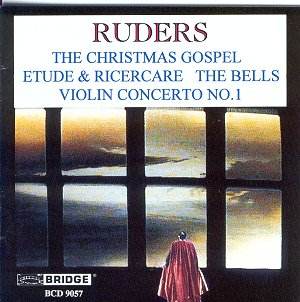Poul Ruders is the most distinguished Danish composer
of his generation. His music has been fairly well represented so
far, at least on CD. Bridge’s ongoing series of Ruders recordings
has played a major part in this representation. The release under
review is Volume 2.
The Violin Concerto No.1 of 1981
is Ruders in his neo-classical mood. He revisits some Neo-classical
trends and remoulds them in his own inimitable way, which implies
a good deal of mild irony. He weaves allusions or brief quotes
from Vivaldi’s ubiquitous Four Seasons into his
own sound world, which results in somewhat unexpected harmonic
clashes. In the first movement (Echoes of a Spring), brief
quotes from Vivaldi’s Spring are confronted by, engulfed
in or contradicted by Ruders’ own music, in a way not unlike Schnittke’s.
A brilliant cadenza leads into a beautiful lullaby (Ninna-nanna)
which is entirely of Ruders’ own making and in which he allows
his natural lyricism to sing freely. This is a beautiful simple
melody floating freely over a passacaglia-like bass line.
The final Winter Chaconne quotes again from Vivaldi but
also from a song from Schubert’s Winterreise. At
the very end, the music ‘freezes’ on a high E-natural played by
the violin.
Poe’s verse has already attracted some attention
from several composers, and one of the best known settings is
Rachmaninov’s choral symphony The Bells, on Poe’s
eponymous poem. Ruders’ own setting for soprano and ensemble was
written on a commission from the Nash Ensemble. From the start,
Ruders had Lucy Shelton’s voice in mind; and, needless to say,
she sings beautifully in this recorded performance. This is a
brilliant, virtuosic setting in which the composer followed the
various implications of the words and translated them into sound.
The music aptly and often vividly reflects the moods suggested
by the words. The end is particularly gripping in its simplicity;
the repeated words in the poem being echoed by the mournful tolling
of hollow (prepared?) piano chords. It may interest some to know
that there exists another setting of The Bells, by the
Belgian composer Jean Rogister, for reciter, flute, oboe, harp,
piano and string quartet composed in 1924, rarely heard and still
unrecorded at the time of writing.
Etude and Ricercare was written
for David Starobin for whom Ruders also composed his two guitar
concertos, Psalmodies (1989, on Bridge 9037) and
Paganini Variations (2000, on Bridge 9122, to be
reviewed shortly). This is a substantial Prelude and Fugue in
all but name. It expertly and idiomatically exploits the many
possibilities of the instrument, conspicuously stripped bare of
the Hispanic clichés too often associated with it. The
short Etude leads into a complex, intricately contrapuntal Ricercare.
A major addition to the guitarist’s repertoire; definitely very
taxing but well worth the effort.
In 1994, Ruders composed his first film score
for Trine Vester’s short movie The Return of the Light
using no spoken dialogue and combining animation and live-acting.
The music is continuous throughout and re-tells the Christmas
story in barely ten minutes. The film score was given a new lease
of life under the title The Christmas Gospel heard
here. This is Ruders at his most inventive and imaginative conjuring
colourful, sharply characterised musical sketches moving at great
speed, with many fine and arresting orchestral touches displaying
Ruders’ orchestral mastery. A number of unusual percussion instruments
were specially created for this work by the Danish percussion
virtuoso, Gert Sørensen. This is one of Ruders’ most accessible
scores, in which the composer manages to be simpler while never
writing down to his potential audience. Significantly too, Ruders
managed to dispense with the all too obvious quotations of Christmas
carols, although a tune in the 28th section (The
infanticide) comes quite near to one. One cannot but wonder
why this lovely work is not heard more often, though one realises
that the extra percussion needed may partly account for the lack
of performances.
From quite early in his career, Ruders displayed
an incredible aural imagination in some striking, highly personal
pieces which seemed then rather radical or ‘advanced’. Over the
years, he considerably enlarged his expressive and emotional palette,
although his music still has some mild irony in store. The First
Violin Concerto belongs to ‘early’ Ruders but the other pieces
show a composer in full command of his aims and means, no longer
afraid to give his lyrical nature full rein.
These performances, by distinguished artists,
all having a long association either with the composer or the
works (or both), serve the music well and make this a most desirable
release.
Hubert Culot
